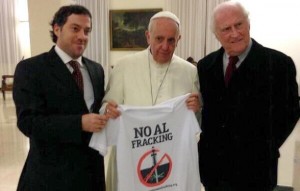There’s been some smart commentary in The Spectator from Damian Thompson, a former editor-in-chief of the Catholic Herald, on Laudato si the Pope’s eco-encyclical, due to be released tomorrow, but already extensively leaked. It’s (obviously) fair to wait to see what the final document actually says before making too detailed a critique, but the Vatican’s complaint that the leak was a “heinous act” would suggest that what has been leaked is not too far off the mark, and so some discussion seems more than reasonable.
Thompson’s comments are even-handed and I’d recommend reading them in full.
He also cites an article by Bjorn Lomborg in USA Today.
Here’s an extract:
A cruel truth is that almost every significant challenge on Earth hits the poor more than the wealthy: hunger, a lack of clean drinking water, malaria, indoor air pollution. The question then is how we make the most difference for the most vulnerable. A reasonable starting point is to listen to the world’s citizens. A United Nations survey of 7.5 million people found that many other issues are deemed more urgent. The top priorities were education, health, jobs, corruption and nutrition. Of 16 problems, the climate was rated the lowest priority.
One reason may be that today’s climate policies themselves have a cost, which predominantly hits the poor. Cuts in electricity consumption require price hikes that hurt the worst-off and elderly. Relying on expensive green energy sources like wind and solar power makes electricity pricier and less available for those who desperately need it. The biggest problem with today’s climate change policies is that they will cost a fortune for very little good. The toughest global warming policy today is the European Union’s commitment to cutting 20% of greenhouse gas emissions by 2020. This will cost $235 billion. And cut temperatures at the end of the century by a measly 0.1ºF.
If Pope Francis is, like he likes to claim, interested in truly helping the world’s poorest Lomborg suggests that he look elsewhere, to improved access to contraception, say, and lowering restrictions on trade. Well, we already know what Francis thinks about the former (Fair enough, but that does not remove the topic as a legitimate area of focus when assessing his contribution to the debate) and, as for the latter, well, let’s just say Francis, sticking to his Peronist roots, is no fan of the mechanisms that have improved the lives of so many in the past few decades.
Thompson:
Lomborg is too diplomatic to say so, but the new encyclical creates the impression that – yet again – a Pope is genuflecting before the United Nations. Every recent pontiff has developed this bad habit. Their intentions are honourable, but I can’t help wondering whether the long Catholic-UN romance owes something to a natural fit between the corrupt Roman Curia and its sleazy counterparts in the UN.
In this document, however, Francis goes further than his predecessors: he endorses the UN’s diagnosis of and solutions to the complex problem of climate change. That’s his prerogative, but don’t let anyone tell you that he’s speaking ex cathedra. Jeb Bush, a Catholic, has every right to say – as he did this week – that, with all due respect, he doesn’t take his economic policies from the Supreme Pontiff.
Laudato si isn’t just about the environment: it’s a political statement by the Pope. He knows very well that climate change has been dragged into the Left vs Right culture wars, not only in the secular arena but also in the Catholic Church.
Indeed he does, and he’s making very clear where he stands.
Meanwhile, remind me again why Speaker Boehner has invited Pope Francis to address Congress.
Note: I still cannot link to URLs so:
http://www.nationalreview.com/corner/419934/laudato-si-andrew-stuttaford
http://blogs.spectator.co.uk/coffeehouse/2015/06/the-pope-and-climate-change-francis-is-slapping-his-conservative-critics-in-the-face/
http://www.usatoday.com/story/opinion/2015/06/16/pope-francis-climate-change-poverty-column/71241024/

